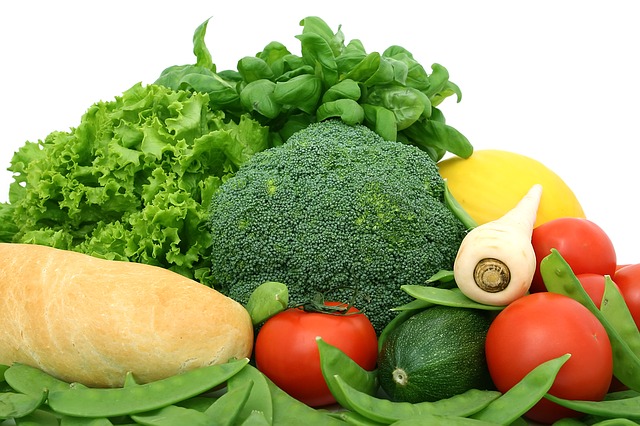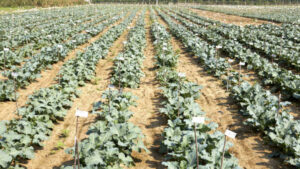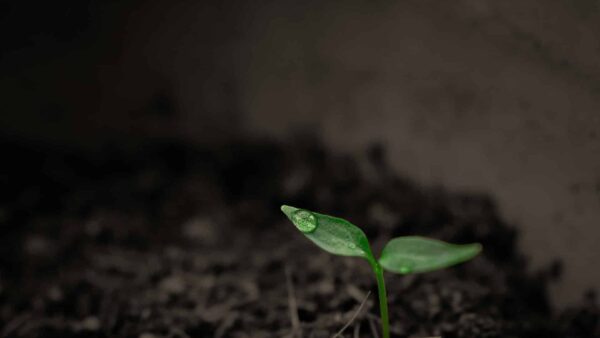The BRESOV project seeks to provide climate-resilient cultivars addressed to organic vegetable production systems. These new cultivars will benefit organic growers, and the organic seed industry, both under current and future scenarios of climate change. The genetic variation of broccoli, kohlrabi, bean and tomato will be assessed for enhanced productivity, by exploiting up-to-date knowledge of genome structure and function. The seed industry is represented by ESA.
One of the new EU Research and Innovation projects is BRESOV (Breeding for Resilient, Efficient and Sustainable Organic Vegetable production), which aims to tackle the nutritional challenges of a growing world population and changing climatic conditions by enhancing productivity of different vegetable crops in an organic and sustainable farming infrastructure. Elsewhere in this issue you can read the contribution of the BRESOV project coordinator, Prof. Branca. The project involves 22 partner institutions from 10 European countries as well as China, Tunisia and South Korea, and is characterised by a multi-actor approach placing special emphasis on the input and needs of the breeding and farming sector. Among the partners, the seed sector will be represented by the European Seed Association (ESA), and with ESA’s Christophe Rouillard serving as the main contact. That gives reason for European Seed to get his take on this project.
European Seed (ES): Christophe, can you tell me a bit more about the ESA involvement in BRESOV project?
Christophe Rouillard (CR):The European Seed Association (ESA) is proud to represent companies active in research, breeding, production and marketing of seeds of agricultural, horticultural and ornamental plant species – including for the organic sector.
ESA members are at the cutting edge of organic seed production, working to develop solutions for the farmers and benefits for the society as a whole. This is done through field trials – demonstration fields, seed production and processing facilities, seed cleaning technologies, and specific packaging facilities – all to cater for the growing organic market.
The vision of BRESOV is to explore the genetic diversity of broccoli, snap bean and tomato and to improve the competitiveness of these three crops in an organic and sustainable environment. The overall aim is to increase the plants’ tolerance to biotic and abiotic stresses and to the specific requirements of organic and low-input production processes. Therefore, it is important for the ESA to actively take part in the BRESOV Project.
ES: Only three crops were chosen for this project. Why broccoli, bean and tomato over other crops?
CR: Broccoli, bean and tomato are economically three of the most significant vegetable crops, also important in the organic sector. They were chosen to serve as a model for the enhancement of other crops.
ES: In your view, how does organic breeding differ from conventional breeding?
CR: Breeding and seed producing companies, members of the ESA, have been adaptive in meeting the growing and changing demand in the organic sector – including the switch from using untreated conventional seed to producing certified organic seed. Working to ensure that organic farmers have sufficient seed drives their investment decisions. A revised regulation for the European Union on organic production and labelling of organic products shall apply from 1 January 2021. This new regulation will establish a temporary experiment seeking to establish conditions for the development of “organic varieties suitable for organic production”, driven by demands from some organizations to foster and develop ‘exclusively organic breeding programmes’.
ESA members believe that current breeding programmes are the most effective in meeting the precise needs of the organic sector. Starting with as wide a genepool as possible (i.e. conventional breeding programme) allows for the possibility to select the best lines or varieties for organic growers; from here the choice and quality of varieties will be at its highest.
Existing programmes also allow for ‘fast innovations’ in the case of breakthroughs for certain disease resistances; it would be shame to deny the organic sector such breakthroughs made in conventional breeding programmes.
Lastly, exclusively organic breeding programmes would, based on the size of the sector, be much smaller, thus more expensive, riskier (exposure of bred lines to diseases, pests, etc.) and consequently lengthier; such an approach is contrary to the urgent needs of growers – especially organic growers – to meet future agricultural challenges such as climate change and emerging pests and diseases.
ESA believes that the best way to approach such a discussion is to ensure the appropriate use of terminology and to maintain choice for growers to use varieties developed from different breeding programmes.
ES: Between biotic and abiotic stress, which of these stresses is most important and is the project planning to tackle first in each of the crops?

CR: The BRESOV project is ambitious as the selection of pre-breeding / breeding lines for the three species will be undertaken in organic vegetable farming systems, utilizing an annual crop rotation scheme. New cultivars will be selected for efficiency when grown under water, temperature and nitrogen stress, for resistance to some pests and diseases, for desirable product quality and traits such as taste, visual appearance, post-harvest performance.
ES: There are many other breeding efforts out there, trying to provide climate resilient varieties in crops. What sets your project apart from the rest?
CR: In this project, the genetic variation will be investigated by exploiting up-to-date knowledge of genome structure and function. This work will be enhanced by the active involvement of farmers, advisory services, research institutes, breeding companies and food processors from diverse geographical and climatic contexts in Europe and non-EU Countries. Crop genetic diversity will be broad as several landraces and crops wild relatives provided by partners will be utilized in pre-breeding and breeding activities. BRESOV will adopt an innovative approach where plant traits related to the roots-zone, and to root-growth, and architecture that enable a better interaction with organic soil and its microbiome are sought to benefit to the end-users.
ES: The project will be using landraces and wild relatives, for which the breeding to commercial varieties will take considerably longer. What do you hope to deliver at the end of the four-year project?
CR: The BRESOV project hopes to ensure that the available genetic resources and bred-germplasm, combined with the best on farm management practices will enhance resource efficiency and productivity. We want to offer new varieties adapted to the organic farming standards and with good productive performance.
ES: How will the private sector be involved in the BRESOV project?
CR: The private sector is mainly involved, through the European Seed Association (ESA), in the BRESOV project by seating at the stakeholder advisory committee. Some breeders and seed companies also declared through a letter of support their interests in the BRESOV project.
ESA, as a partner of the project, has committed to take part in the activities of the BRESOV project related to the dissemination and communication of the project’s results. ESA will provide strategic leadership for the project communication meaning it will be able to organise promotional and dissemination activities, reaching out to plant breeding companies, managers, breeding associations and seed companies.
There is more to organic seed production than simply breeding. ESA members do believe in the need to develop new seed enhancement and disinfection methods compliant with organic production rules. These not only help to boost the competitiveness of the organic sector but can also be applied to practices in the conventional sector. Therefore, ESA, thanks to some breeders that will be involved in performing trials at their premises, will also take part on specific tasks aimed at identifying the optimal conditions to maximize the quantity and the quality of the production of organic seeds for tomato, brassicas and bean.
ES: Do you expect that the outcome can be translated to other crops?
CR: The outcomes of the BRESOV project are expected to be not only useful to the tomato, brassica and bean sectors but to serve as a model for the enhancement of other crops. Although, this possibility will have to be further analysed.
ES: New plant breeding techniques could possibly help in achieving the BRESOV goals (better mineral efficiency, higher resistances, less crop protection products). Are these techniques within the scope of the project?
CR: ESA believes that the best way to approach this is to maintain choice for growers to use varieties developed from different breeding programmes and with the help of different breeding tools.
From our point of view, the latest breeding techniques may play a crucial role in Integrated Pest Management, for instance, via increased resistance to pests and diseases. Organic farmers have less choices available to fight pests and diseases, and this is foreseen to be a crucial limiting factor to mainstream organic production.
ES: Several reports indicate that organic agriculture has a lower yield and will not be able to feed the planet in a sustainable way. Is there really a need for such a project?
CR: As members of the seed industry, one of our principles is freedom of choice for our customers, as a result of innovative and diverse technologies and production methods. It is our ambition to provide the highest quality of plant reproductive material for all types of agriculture answering the needs and requests of our customers.
In this respect, many consumers have chosen or included organic food in their daily diets and the agri-food chain as a whole tries to deliver what these consumers are demanding. The seed industry is only one actor in this chain, even though an important one right at the start of production.
There is a clear lack of knowledge in organic production chains and up to the consumer regarding the special challenges of food production under organic conditions. We felt that education and better understanding of realistic objectives were needed. That’s why the seed industry decided to get involved in this project.
ES: What are the risks associated with this BRESOV project?
CR: This project targets a very specific type of production for very specific crops in a represented yet limited number of sites. Therefore, the results cannot be easily extrapolated to other crops or conditions. A risk could be that decision makers see this project as delivering a “one size fits all” solution for better organic seed production across all species and areas. That would not be the case.
ES: The project claims that organic produce has health benefits whereas numerous reports claim otherwise. Is the project based on the right assumptions?
CR: I don’t think we, at ESA, are competent to judge this. That would need to be done by knowledgeable experts. For us, as seed sector, the point of research here is what can be realistically be done in practice to improve quality and quantity of organic seed production. This is a relevant scientific as well economic question for companies already engaged in this market or considering future product development.
ES: Should the money be spent in a different way?
CR: The current level of knowledge about the feasibility of organic seeds produced under organic conditions is pretty low. Projects like this can help to build the know-how and see what is realistic and economically viable and where it may be necessary to accept that there will always be a limited choice available for those farmers who decide to grow organic crops. We still talk about a niche market of course and such markets operate under specific economic constraints. From our point of view, it is now premature to say whether it is the case or not. One outcome of the project will hopefully be that we get a bit more clarity and common understanding to challenges and solutions, of possibilities and limitations.
Where on the web: https://bresov.eu/about
Editor’s Note: Christophe Rouillard is Technical Manager Plant Health and Seed Trade at the European Seed Association (ESA).











